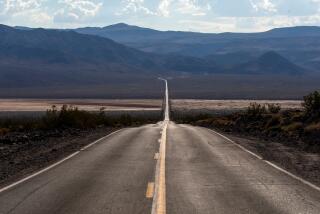Brother, Can You Spare a Ride?
- Share via
WESTMINSTER — Orange County residents Paul Booker and Kenneth Ulrich were among 3,000 senior citizens who responded to a 1992 Modern Maturity ad that resulted in “Riding the Rails.”
Although neither man appears on camera in the documentary (only 10 respondents do), their trenchant letters and subsequent interviews with the filmmakers contributed to its content. Their words will also probably appear in a companion volume to the film due this spring.
Paul Booker left home at 16 to hitchhike across America, thinking he was real tough.
*
“I changed my mind when suddenly I was thrust naked into the buzz saw of life,” he said in an interview last week. “I was nearly killed a half-dozen times in the next two months.”
Booker’s father had died without life insurance eight years earlier, leaving his mother to support two sons on her $10-a-week dishwasher’s pay. But it was adventure lust, not financial desperation, that made him strike out from Bedford, Ind., with the $35 he had earned as a caddy. Booker hitchhiked to Detroit, Niagara Falls, N.Y., and New York City.
Thumbing was illegal in some states, though, so he eventually hopped a freight south.
“If you were caught [hitchhiking], it meant 30 days on the dreaded chain gang building roads,” recalled the retired machine-mold maker, 82, from his floral living room couch in Westminster.
But riding a train through Texas proved even more treacherous.
The Lone Star State was home to the dreaded Texas Slim, Booker explained, a railroad police detective widely known for being “meaner than a rattlesnake.” He spotted Booker and others on a reefer, or refrigerated train, and began firing as they fled.
“He stood on top of a boxcar and he had a gun in each hand, shooting at us. . . . Bullets were going by my head and hitting the dust by my feet, and I [had to] zigzag to keep from getting killed. It was like the Old West, and he thought he was Wyatt Earp or somebody.”
Recounting another close call, Booker said he took a nap one day in the space between two boxcars while in transit to Seattle. A sudden lurch of the slow-moving train threw him to the rails, but he managed to grab a steel beam just in the nick of . . .
The twinkle in Booker’s eye faded and his voice cracked as he recalled the “most spectacular sight” of his rail adventure: “a thousand desperate men sitting, if they could find a space, atop this mile-long freight train.”
They were all headed to California to find work.
“It was like ‘The Grapes of Wrath,’ ” Booker said. “No one would hire them because they weren’t state residents. Back then, they had no welfare, no unemployment insurance, no Social Security. If you didn’t have any work or any money, you just starved, or they’d send you to what they called the poorhouse. And nobody wanted to to go there.”
In another state, Wyoming, Booker again faced the barrel of a gun. “I and about 40 or 50 men were in empty boxcars, hungry, thirsty and desperate, but we would have been shot if we had tried to get off the train. [At this stop] dozens of townsmen stood with their guns pointing at us, cursing and threatening to kill us if we tried to leave the train. They didn’t want us in their town, where we would be begging for food or trying to steal it.”
After two months and 40 states, with scabs on his parched, sunburned lips, Booker hitchhiked the final 275 miles home.
“My mother and brother were glad to see me, but my dog Spot barked viciously at me until he smelled my feet. Then he went wild with joy, jumping affectionately on me for five minutes.”
More to Read
Only good movies
Get the Indie Focus newsletter, Mark Olsen's weekly guide to the world of cinema.
You may occasionally receive promotional content from the Los Angeles Times.







